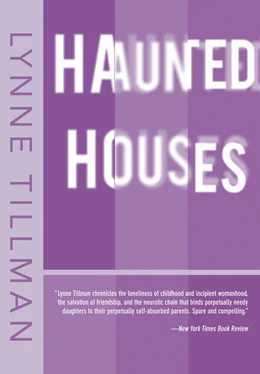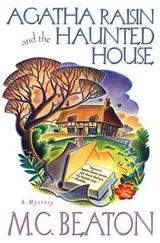Lynne Tillman - Haunted Houses
Здесь есть возможность читать онлайн «Lynne Tillman - Haunted Houses» весь текст электронной книги совершенно бесплатно (целиком полную версию без сокращений). В некоторых случаях можно слушать аудио, скачать через торрент в формате fb2 и присутствует краткое содержание. Год выпуска: 2011, Издательство: Red Lemonade, Жанр: Современная проза, на английском языке. Описание произведения, (предисловие) а так же отзывы посетителей доступны на портале библиотеки ЛибКат.
- Название:Haunted Houses
- Автор:
- Издательство:Red Lemonade
- Жанр:
- Год:2011
- ISBN:нет данных
- Рейтинг книги:5 / 5. Голосов: 1
-
Избранное:Добавить в избранное
- Отзывы:
-
Ваша оценка:
- 100
- 1
- 2
- 3
- 4
- 5
Haunted Houses: краткое содержание, описание и аннотация
Предлагаем к чтению аннотацию, описание, краткое содержание или предисловие (зависит от того, что написал сам автор книги «Haunted Houses»). Если вы не нашли необходимую информацию о книге — напишите в комментариях, мы постараемся отыскать её.
, Tillman wries of the past within the present, and of the inescapability of private memory and public history. A caustic account of how America makes and unmakes a young woman.
Haunted Houses — читать онлайн бесплатно полную книгу (весь текст) целиком
Ниже представлен текст книги, разбитый по страницам. Система сохранения места последней прочитанной страницы, позволяет с удобством читать онлайн бесплатно книгу «Haunted Houses», без необходимости каждый раз заново искать на чём Вы остановились. Поставьте закладку, и сможете в любой момент перейти на страницу, на которой закончили чтение.
Интервал:
Закладка:
Most of the people in the house at Riverdale were research psychologists or classical musicians. Jane was the only college girl. To get rid of my virginity, I have to lose weight, she thought, but found it impossible in the house, where, with so many people around, someone was always eating. One of the research psychologists was a thin man with thick glasses. He had the cleanest room. Whenever Jane passed his door she looked in. The bed was always made and nothing was out of order. The books were stacked in even piles. The pens were in a holder. What distressed her most was that his shoes were always exactly in the same place under his chair, equidistant from the legs of the chair, and lined up precisely with the back of the chair. He never said too much but, like his room, whatever he said was in order. They all had dinners together, and Jane became friends with Ollie, a violinist with flat feet. At night when she couldn’t sleep he’d come to her gothic bedchamber and play, at her request, her favorite lullabye: Rockabye and good night with roses and lilies. Her grandmother’s name was Rose, and her aunt’s name was Lillie, and slowly she’d fall asleep while Ollie fiddled in the doorway. Jimmy’s mother requested an appointment with him, and they met at a decent bar, her words for his choice, at the base of the Empire State Building, Jimmy remembering that Jane had told him she used to meet her sisters at the base of the building and never having looked up, didn’t know that the tallest building in the world rose above her. What a dope, he thought, as his mother ordered a whiskey sour and asked about the cinema. It’s going all right, he answered. Crow’s feet on her, looked to him like the footprints of a small bird pressed onto thin skin. She was thin-skinned. After her second whiskey sour she complained about his father, and placed her pale hand on his, a dirty male version of hers. He felt like a male version of her in all respects, and always agreed with her assessments of his father. In complicity he drank down another beer. Her lipstick had smeared slightly and her speech slurred and he thought she was the most beautiful woman he’d ever seen. When he left her in Penn Station at Track 19 he felt he could see through her, read her thoughts, and he turned abruptly, went to a phone booth and called Maurice, who said he was free for dinner and did Jimmy want some too?
Her father reading Lord Chesterfield to her, at bedtime, like Polonius to Ophelia, giving advice in order to repress her, this was not an easy thing to explain to Uncle Larry, who said, “When your father was very little, he always protected me. I was his baby brother. But he wasn’t that big himself. We were only fifteen months apart. And we lived in a rough neighborhood. You don’t know anything about that, they protected you from that.” Larry had lost at the races again. “Our mother never combed her hair, that’s why when he sees yours, he goes a little nuts.” Larry paused and puffed. “You do comb it when you see him, don’t you?” “When I see him, I comb it, Larry.” The men in the family didn’t lose their hair; it was a source of pride to them. They kept their hair and lost at the races and lost in business. “The textile industry,” Larry was going on, “used to be lots of smalltime people. Till the mid-fifties. Then the big guys moved in — vertical, or was it horizontal, monopolies — they bought everything — the mills, the cotton, the department stores, everything. There wasn’t any place for the little guy. And your father didn’t want to sell. And by the time he wanted to sell, it was too late. The story of my life, sweetheart.”
Jimmy was acting like a real jerk. Saying he’d meet her, then not showing up, or showing up much later. His excuse was that he didn’t like her castle on the Hudson. She didn’t think it was that. She thought he was angry at her. What was it he said? She was reading things into it. She put down her diary and stared straight ahead. The phone started ringing and she ran to answer it.
The research psychologist with the cleanest room had driven into a concrete wall; it appeared to have been deliberate, onlookers said, said the cop. Onlookers wasn’t a word you heard much outside this kind of dialogue and Jane found herself fixing on it. She had looked in on him. “Jimmy thinks I read too much into things,” she told Felix when they met accidentally on a street corner in the East Village. His eyes looked even more cracked and his bones were sticking up, almost saluting from his face. “You’ve got a weird imagination,” he told her, “but you’re still a virgin, and that’s shit, and you still think that Jimmy is a valentine, when he’s more full of shit than you are.” “I’m not a virgin,” she lied. “Okay, let’s go to my place.” “What about your girlfriend?” Felix told her that was his problem, not hers. Jane looked carefully into those cracked eyes. She hadn’t seen him in a while. Felix played with the buttons of her pea jacket and whispered that the best way it could happen would be with him. “In France,” he said, “an older man, a friend of the family, usually does it.” A horse being broken struggled on the sidewalk before Jane’s eyes and she declared, adamantly, “I’m not attracted to you.” Felix refused to believe her, his ego at that moment as big as the Alps were high. He relented. “Then let’s get a cup of coffee and go to a movie.” Jane placed her hand in his — he said, “Your hands are very small”—and inside her she knew that there was no way in hell that Felix would ever be considered a friend in her family.
Chapter 9
Emily was in her room, lying on the bed and reading further into the mind of John Winthrop. Did he love his wife too much? How could one be good and show it, make it visible, apart from accumulating a fortune? The good are famous because they’re known, but are the famous good, and is that why, once they’re famous, they’re examined so carefully, so critically? America as the visible kingdom of the righteous. “All labored hard and some by so doing amassed great wealth or won fame among their fellow men — but never dared enjoy it…Puritanism required that man refrain from sin but told him he would sin anyhow…The evil of the world was incurable and inevitable…Winthrop’s life vibrated dizzily between indulgence and restraint.” Emily wrote these lines from Morgan’s book, The Puritan Dilemma , in her notebook, where she kept ideas that she would use later, in papers or poems. She wondered if people ever footnoted quotes in poems or just made references that everyone was supposed to know or look up. Writing a poem was supposed to be different from writing a paper. Indulgence and restraint were not, it seemed to Emily, the parameters of her life. That evil might be incarnate, that we might sin even if under restraint, that it might all be incurable, left her in a hollow mood, some of which she expressed to Edith as they watched Our Town on television. Emily felt sorry for John Winthrop, his struggle between good and evil, her duel carried with a different fervor. First of all, what was good and what was bad? Just think of all the witches they burned, Edith dutifully reminded her tenant, who she thought needed to toughen up at the edges. Hadn’t that English musician told Emily that anyone could see the red crosses in her blue eyes, and though she bought dark glasses, she would never be able to disguise them.
Edith and Emily finished another box of Royal Lunch crackers. Not salty, Edith noted to herself, looking at her stomach, while Emily glanced in the direction of her own and wondered if she might be pregnant. That English musician, and now they didn’t even sleep together anymore, which was a certain kind of irony that would be anathema to John Winthrop, whom she knew would have no sympathy for her. What would she do about it if it were true. She didn’t mention this to Edith, whose eyes had filled like swimming pools as she cried silently. Edith was of course thinking about her husband and Emily made a mental note that Our Town was a kind of pornography, playing so graphically on morbidity and sentiment. Emily conjured up Nora, who had not died but whom she not saw again sitting under the kitchen table, her hand to her heart, waiting for her heart to stop.
Читать дальшеИнтервал:
Закладка:
Похожие книги на «Haunted Houses»
Представляем Вашему вниманию похожие книги на «Haunted Houses» списком для выбора. Мы отобрали схожую по названию и смыслу литературу в надежде предоставить читателям больше вариантов отыскать новые, интересные, ещё непрочитанные произведения.
Обсуждение, отзывы о книге «Haunted Houses» и просто собственные мнения читателей. Оставьте ваши комментарии, напишите, что Вы думаете о произведении, его смысле или главных героях. Укажите что конкретно понравилось, а что нет, и почему Вы так считаете.












